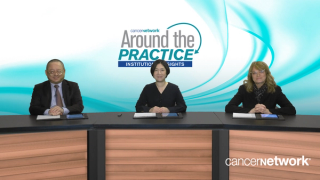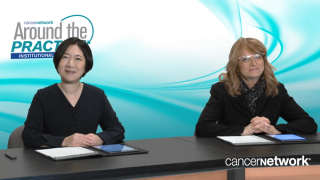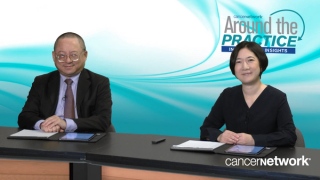
Lung Cancer
Latest News

Latest Videos

CME Content
More News

Erica C. Nakajima, MD, discussed a pooled analysis analyzing immune checkpoint inhibitors with or without chemotherapy in the frontline treatment of patients with KRAS-mutated non-small cell lung cancer and PD-L1 expression.

Dr. Nabil Rizk, Chief of Thoracic Surgery on increasing participation and accessibility of lung cancer screening.
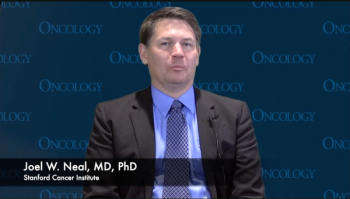
In terms of tumor control, treatment with cabozantinib and atezolizumab led to an overall response rate of 19% among patients with advanced non–small cell lung cancer, according to Joel W. Neal, MD, PhD.

Best treatment approaches for patients with advanced NSCLC in the context of individualized therapy and an evolving therapeutic landscape.

Closing out their review of the second patient scenario, panelists define treatment options for NSCLC with both EGFR mutation and PD-L1 expression.
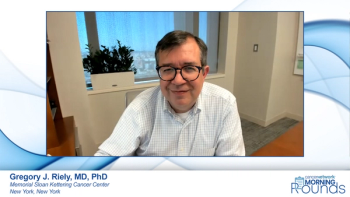
Expert oncologists consider how they would approach molecular testing in a 73-year-old Asian woman diagnosed with advanced non–small cell lung cancer.

“Opportunities to escalate therapies that work well in stage IV into what we consider a more curative setting...are exactly what we need to be looking for.” –Mark A. Socinski, MD

Findings from the phase 3 ADURA trial indicated that patients with EGFR-mutated, stage II to IIIA non–small cell lung cancer (NSCLC) experienced a promising reduction in risk of disease recurrence or death following treatment with adjuvant osimertinib.

Findings provided rationale to limit air pollution and highlighted the need for molecularly targeted lung cancer prevention due to particulate matter being revealed as a mechanistic driver for EGFR-positive NSCLC.
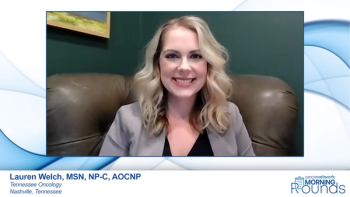
Focusing on second-line treatment options for EGFR-mutated advanced NSCLC, panelists review the use of mobocertinib and amivantamab, respectively.

Experts briefly reflect on optimal frontline treatment strategies for a patient who presents with EGFR-mutated advanced non–small cell lung cancer.

Centering discussion on a 57-year-old man with advanced NSCLC, panelists consider molecular testing strategies and the subsets of EGFR mutation.

A brief reflection on optimal patient education strategies, specifically regarding biomarker testing, in the setting of non–small cell lung cancer.

Closing out their discussion on NSCLC biomarker testing assay selection, panelists consider the optimal use of these assays in their own patients.

Expert oncologists provide a comprehensive review of available biomarker testing assays utilized in patients diagnosed with non–small cell lung cancer.

Positive trends in screening of patients at high risk of lung cancer may double survival in this malignancy, according to Giorgio V. Scagliotti, MD, PhD, at 2022 WCLC.
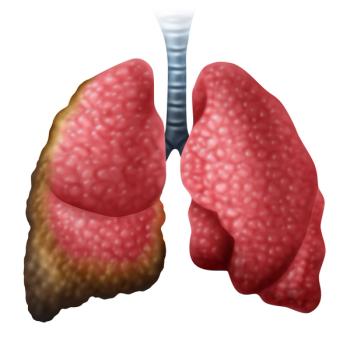
Results from the phase 2 PEMMELA trial revealed positive treatment benefits in patients with malignant pleural mesothelioma who were given pembrolizumab plus lenvatinib.

Follow-up to the phase 2 NAVIGATE and phase 1 LOXO-TRK-14001 trials showed durable responses and extended survival in patients with NTRK fusion–positive lung cancer who were treated with larotrectinib.
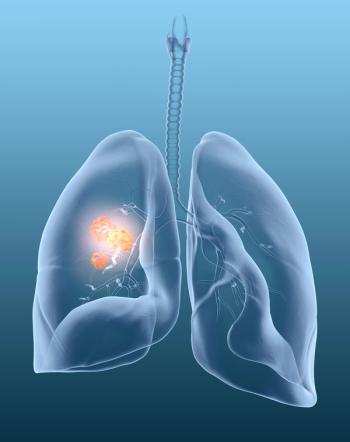
Experts indicated that 77% of women with lung cancer who were surveyed reported having moderate to severe sexual dysfunction.

Closing out his discussion on actionable mutations in NSCLC, Roy Herbst, MD, PhD, discusses optimal sequencing of EGFR-targeted agents.

Considerations for use of novel EGFR-targeted agents osimertinib, amivantamab, and poziotinib in NSCLC, in the context of respective clinical trial data.

Roy Herbst, MD, PhD, provides insight on the importance of EGFR mutations, both common and rare, in patients with non–small cell lung cancer.

Expert perspectives on molecular profiling strategies that may help overcome barriers to testing in non–small cell lung cancer.

Expert oncologist Roy Herbst, MD, PhD, provides a comprehensive overview of actionable mutations and molecular profiling in NSCLC.

Before closing out his discussion on NSCLC, Sandip Patel, MD, shares his excitement for evolving targeted strategies and improved patient outcomes.







